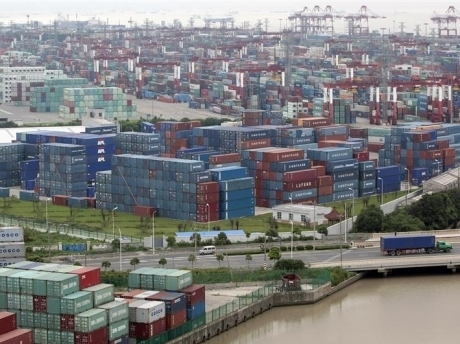By Will Bland

Source: Reuters
“China is a puzzle, India is a puzzle - they don’t deserve to grow so much.”
Speaking at his country’s embassy on Tuesday, Arvind Subramanian, an Indian economist who used to work at the IMF, scarcely bothered to defend his discipline for failing to anticipate the fastest growing economies over the last two decades.
“The two countries that have done the least by way of reform, the two countries that remain the most protective on any score – privatization, trade, financial sector, capital account – the two least liberalized countries in the world are China and India,” Subramanian told an audience of journalists and diplomats.
Despite his difficulty explaining China’s ascent over the last couple of decades, the Peterson Institute scholar is at the bullish end of the China watchers spectrum. He says there’s “no doubt” that China’s gross domestic product has already surpassed America’s when measured by purchasing power parity.
Watching Barack Obama’s policy in the Pacific, he reasons that the U.S. President might be leading his country down the path that Britain took in Suez, when Prime Minister Antony Eden sought to assert his country’s authority in the Middle East, but instead had to back down on the orders of the world’s new superpower.
The U.S. President’s ability to give commands to the British Prime Minister was backed by America’s ability to bankrupt the United Kingdom by withdrawing financial aid, says Subramanian, who sees parallels between this relationship and China’s current status as by America’s biggest creditor.
At the Indian embassy event, Subramanian was setting out his vision of a new world order alongside one of his old school friends, Eswar Prasad.
Prasad, who used to be head of the IMF in China, says that Beijing seems to have a “passive-aggressive” relationship with the rest of the world, particularly on the global economic stage, where the country’s policymakers haven't yet reconciled themselves to a role befitting the world’s soon-to-be largest economy.
The two economists focused on one element of that role, the internationalization of the yuan, with Prasad forecasting that the yuan will become a component of the International Monetary Fund’s Special Drawing Rights within the next five years.
This step, a small advance along the road to becoming the global reserve currency, will be taken because the IMF needs China, not because China needs the IMF, Prasad argued.
Subramanian expects events to move much faster. He sees the yuan replacing the dollar as the world’s reserve currency within ten years and dismissed references to the 50-year lag between the moment that the U.S. economy became the world’s largest and the moment that the dollar’s became the global reserve currency.
Instead of 50 years, he says that analysts should consider the 10-year lag from the time the U.S. became the world’s biggest trading nation.
The shallowness and illiquidity of China’s capital markets are generally seen as the biggest obstacle to the yuan becoming a reserve currency, but Subramanian says that the country doesn’t have to develop a “world-class U.S.-style financial market system.”
In an appeal that is anathema to American neo-cons, he argues that the best way for other countries to preserve the multi-nation financial system is to empower China – to reinforce the IMF, by getting China to take on a bigger role in the fund.
The alternative –exemplified by Obama’s promotion of the Trans-Pacific Partnership – could revive the kind of fragmented system that accompanied the Cold War. “Down that path lies folly,” he warns.
Links and Sources
The Wall Street Journal Breakfast with Former IMF China Hand Eswar Prasad
Eight Questions: Living in China’s Shadow
Bookings Institute The Role of the Renminbi in the Global Monetary System
Foreign Correspondents' Club of China China\'s Currency: Going Global
